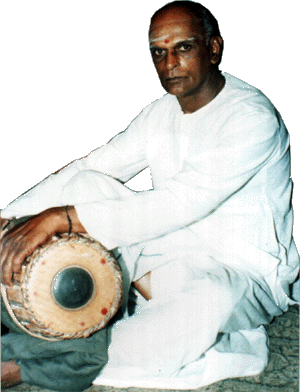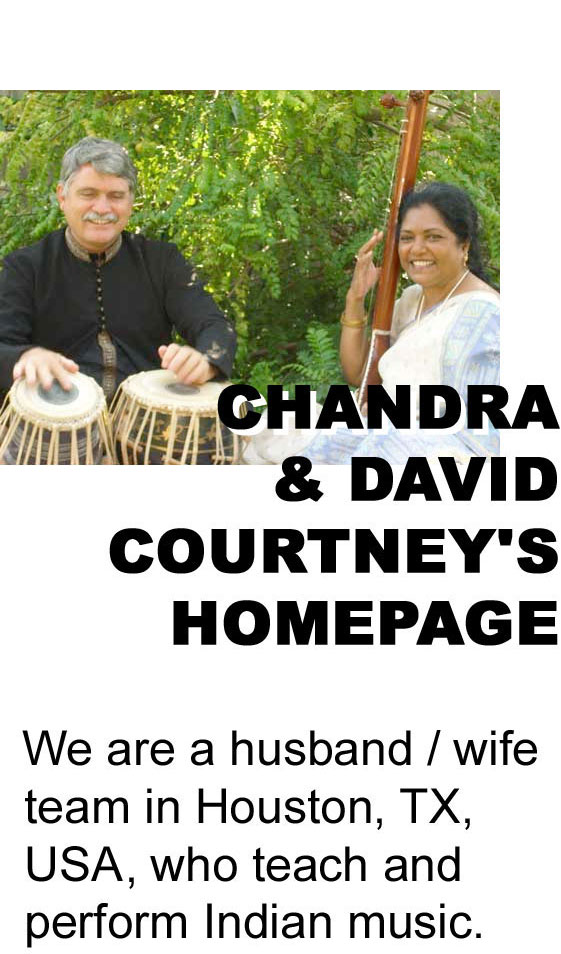
Gopalan Govender: Living Legend
by Kalyani Giri
From the deep recesses of my mind, I draw out my early memories of Shri Gopalan Govender. I was barely ten years old, and at the insistence of my father, a true aficionado of the cultural arts, was compelled to join my younger brother and sister at the tabla classes conducted by the percussion maestro. Seated among other would-be artistes in the conference room at the Vedic Hall in Carlisle Street, drums propped up appropriately, I remember having been in awe of this taciturn man whose hands steadfastly meted out excellent thalam, while he chanted the sollukattu or notation - pausing here and there to correct or encourage a student attempting to reach the guru's exacting standards. I soon discovered that beyond the taciturn demeanor lurked an agile mind and a rapier sharp wit. Recognizing my lack of inclination and aptitude for tabla, I quit lessons of my own volition but my respect and admiration for this great South African who started a renaissance among the youth, instilling in them a sense of pride in their rich cultural heritage, continues to this day.
Hailing from humble beginings, Shri Gopalan along with his eight siblings were nurtured in a household rampant with love, discipline and strong principles. During the 1900's, the dark ages of the arts, when apartheid wrought havoc on the morale of indentured labourers, Shri Gopalan's late parents, Shri and Smt. K. Perumal Govender began teaching the Tamil language and devotional songs at an old wood and iron construction near Durban's Addington Hospital. His father, an accomplished violinist and a dramatist, took to the stage, using his considerable talent to attempt to secure the destiny of the Tamil language in this country. Classes continued to flourish at another popular venue, the Shri Vaithianatha Easwarar Alayam at Umgeni Road. It was inevitable that the children of such dedicated cultural activists inherit an active interest in the arts. At five years of age, Shri Gopalan would tap out rhythm indiscriminately on any solid surface - brass objects, boxes and items producing a satisfying resonance. His father, hoping to encourage this flair for percussion in his young son, invested in a pair of tablas from the then, Orient Music Saloon. The instruments were safely stored within the confines of a huge wardrobe until 1933 - the year Shri Gopalan came under the tutelage of his first guru, Shri Murugas Naidoo of the Transvaal. But even before that in 1931, he had what he deemed a spiritual experience while listening to a recording of Karnatic music.
"My father purchased a record made in India by the renowned vocalist, Sangeetha Kalanidhi Shri Chembai Vaidyanatha Bhagavathar. On this record was the Thygaraja kriti, Raghuvara, in raga Panthuvarali. Mridangam accompaniment was by the incomparable doyen of percussion, Shri Palaghat Mani Iyer. The sound of the drum stole my heart and gave me inspiration to someday learn to play that majestic instrument," Shri Gopalan said reflectively. "While my brothers took lessons in harmonium and violin, I concentrated only on the tabla."
By 1934, he was well on his way to becoming as recognized as the well known musicians of yester-year, Edward Govindsamy, S.P.Reddy, S.A.Reddy and J.R. Devar, whom he accompanied on occasion. He was a founder member of the New India Orchestra in 1940. Stimulated by the sounds of the Ranjeni Orchestra which was formed in the Railway Barracks by S.R. Devar and K.S. Naiker under the original name of the "Railway Youth Orchestral Club", he joined this popular band in 1940 and remained with them until 1951.
Ever present was his craving for a more structured learning, a theoretical and practical knowledge of the mysteries of South Indian classical music beyond what South Africa had to offer. Aided by benefactors such as J.R. Devar, Subbiah Pillay, Gowri and Tholsy Pather - to name but a few - Shri Gopalan's dream of going to India was realized in 1953. He lived in Madras, the cultural capital of South India, for nearly four years, receiving mridangam training from Shri Ranganathan, while taking private tuition in tabla and dholak from Shri M.V. Murthi. He revelled in the ambiance of Madras and the thrill of sitting in Madras Music Academy listening to musical stalwarts he had idolized for so long. An avid autograph collector, Shri Gopalan's anecdotes of his experiences while garnering signatures of Karnatic music giants for his treasured book are by equal measures reverential and hilarious. But he had his duty to fulfil in the country of his birth. Taking the blessings of his gurus, he returned to South Africa - and to a hero's welcome.
Based in Durban, the brilliant young mridangist was much sought after by local and visiting musicians for his elegant and deferential accompaniment, gaining acclaim for his intuitive ability to enhance a performance - never attempting to steal the limelight from the one to whom he rendered pakawaj. To this day, it is a humbling experience to watch him in concert. His consistent excellence in his field have brought him numerous awards inclusive of the Indian Academy of South Africa's prestigious Nadaraja Award in 1985, Natal Tamil Vedic Society's Mahalakshmi Award and the time - honored gesture of respect, the Ponn Aadai or Golden Shawl. He is a trustee of the Natal Tamil Vedic Society as well as a lifelong Honorary Vice President of the southern hemisphere's largest temple, the Shri Vaidyanatha Easwarar Alayam. But despite the felicitations, beyond the kudos heaped on him as a musician excellence, Shri Gopalan is celebrated in his true vocation - that of an extraordinary teacher who indefatigably grooms a number of young students into admirable artistes. He gives unstinctingly of his knowledge, a rare phenomenon in artistic circles where rivalry often supercedes the requirements for excellence. Many of South Africa's finest have at some time come under his tutelage, with his sishya percussionist Magendran Moodley being the best known in contemporary musical circles. Every day of the week sees Shri Gopalan teaching tabla, mridangam or devotional songs to his students, traversing the length and breadth of the city and beyond. He conducts classes in Phoenix, Reservoir Hills and Sea Cow Lake, as well as those legendary classes at the Vedic Hall. He has propagated the rendition of the ancient classics such as the Thevaram, Thiruvasagam, Ramalinga Swami's Thiru Arutpa, and the Thirupugazh - Arunagirinathar's exquisite songs in praise of Lord Subramanya.
To Shri Gopalan and his loving wife Smt. Sarasvathi, his students constitute his large and extended family and no one is more proud of them than he is. He embraces the philosophy of high thinking and simple living. In all his years of teaching, he has never taken money for his services. His views on this subject are definite.
"It is my duty to impart my knowledge and skills to those willing to accept it. My satisfaction comes not from monetary sources but from the spiritual value. It is important to keep one's culture alive - there is no price on that," says Shri Gopalan. He, and like-minded others, who selflessly nourish the nation's cultural soul, ought to be protected by an artiste's union, with financial stability provided perhaps by way of government grants.
Those close to Shri Gopalan will remember with affection, his childlike penchant for the hard candy, Wilson's "Humbugs" - much to the chagrin of Smt. Sarasvathi, who despaired of students furtively bringing him his favorite treat because she feared for his health! Shri Gopalan celebrated 76 years of a prolific life this August, a life made historic by his commitment to teaching the arts. He is truly a jewel in the cultural crown of South Africa.
WEBMASTER'S NOTE - We regret to inform everyone that Mr Gopalan died in November 2001 at the age of 77. He will be missed by all.
Born in South Africa, Kalyani Giri is a journalist residing in Houston, Texas. She can be reached at krishnagiri@aol.com.
© 1998 - 2021 David and Chandrakantha Courtney
For comments, corrections, and suggestions, kindly contact David Courtney at david@chandrakantha.com
